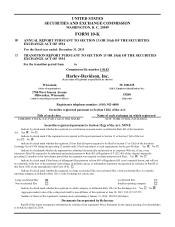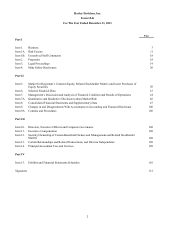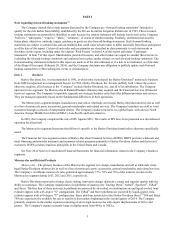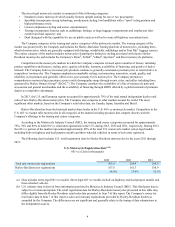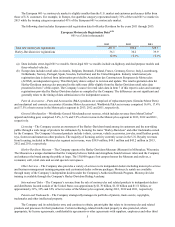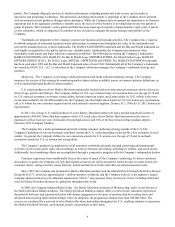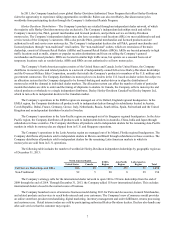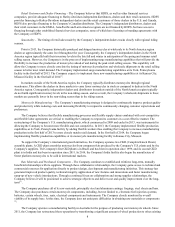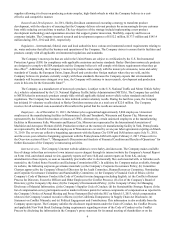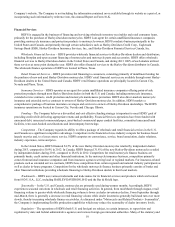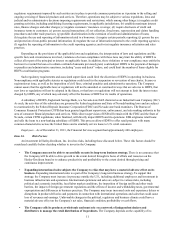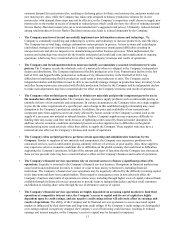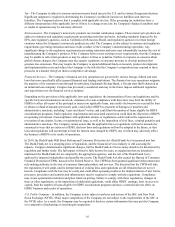Harley Davidson 2013 Annual Report Download - page 6
Download and view the complete annual report
Please find page 6 of the 2013 Harley Davidson annual report below. You can navigate through the pages in the report by either clicking on the pages listed below, or by using the keyword search tool below to find specific information within the annual report.6
parties. The Company diligently protects its intellectual property, including patents and trade secrets, and its rights to
innovative and proprietary technology. This protection, including enforcement, is important as the Company moves forward
with investments in new products, designs and technologies. While the Company believes patents are important to its business
operations and in the aggregate constitute a valuable asset, the success of the business is not dependent on any one patent or
group of patents. The Company’s active patent portfolio has an average age for patents of approximately eight years. A patent
review committee, which is comprised of a number of key executives, manages the patent strategy and portfolio of the
Company.
Trademarks are important to the Company’s motorcycle business and licensing activities. The Company has a vigorous
worldwide program of trademark registration and enforcement to maintain and strengthen the value of the trademarks and
prevent the unauthorized use of those trademarks. The HARLEY-DAVIDSON trademark and the Bar and Shield trademark are
each highly recognizable to the public and are very valuable assets. Additionally, the Company uses numerous other
trademarks, trade names and logos which are registered worldwide. The following are among the Company’s trademarks:
HARLEY-DAVIDSON, H-D, HARLEY, the Bar & Shield Logo, MOTORCLOTHES, the MotorClothes Logo, HARLEY
OWNERS GROUP, H.O.G., the H.O.G. Logo, SOFTAIL, SPORTSTER and V-ROD. The HARLEY-DAVIDSON trademark
has been used since 1903 and the Bar and Shield trademark since at least 1910. Substantially all of the Company’s trademarks
are owned by H-D U.S.A., LLC, a subsidiary of the Company, which also manages the Company’s trademark strategy and
portfolio.
Marketing – The Company is executing a multi-generational and multi-cultural marketing strategy. The Company
measures the success of this strategy by monitoring market shares (where available) across its various customer definitions, as
well as monitoring brand health in various markets.
U.S. retail purchasers of new Harley-Davidson motorcycles include both core and outreach customers and are diverse in
terms of age, gender and ethnicity. The Company defines its U.S. core customer base as Caucasian men over the age of 35 and
its U.S. outreach customers as women, young adults, African-American adults, and Latino adults. In 2012 (which is the most
recent data available), for the fifth straight year the Company was the market share leader in U.S. new motorcycle registrations
(all cc's) within the core-customer segment and in each outreach customer segment. (Source: R. L. Polk & Co. 2012 motorcycle
registrations)
In 2013, the average U.S. retail purchaser of a new Harley-Davidson motorcycle had a median household income of
approximately $90,800. More than three-quarters of the U.S. retail sales of new Harley-Davidson motorcycles were to
purchasers with at least one year of education beyond high school, and 34% of the buyers had college/graduate degrees.
(Sources: 2013 Company Studies)
The Company has a multi-generational and multi-cultural customer marketing strategy outside of the U.S. The
Company's definition of core and outreach customers outside the U.S. varies depending on the profile of its customers in each
market. In general, the Company defines its core customers outside the U.S. as men over the age of 35 and its outreach
customers outside the U.S. as women and young adults.
The Company’s products are marketed to retail customers worldwide primarily through advertising and promotional
activities via television, print, radio, direct mailings, as well as electronic advertising, including its website, and social media.
Additionally, local marketing efforts are accomplished through a cooperative program with the Company’s independent dealers.
Customer experiences have traditionally been at the center of much of the Company’s marketing. To attract customers
and achieve its goals, the Company not only participates in motorcycle rallies around the world, but also in major motorcycle
consumer shows, racing activities, music festivals, mixed martial arts activities and other special promotional events.
Since 1983, the Company has promoted its Harley-Davidson products and the related lifestyle through the Harley Owners
Group (H.O.G.®), which has approximately 1 million members worldwide and the Company believes is the industry’s largest
company-sponsored motorcycle enthusiast organization. H.O.G.® also sponsors many motorcycle events, including rallies and
rides for Harley-Davidson motorcycle enthusiasts throughout the world.
In 2000, the Company initiated Rider's Edge - the Harley-Davidson Academy of Motorcycling, and it is now known as
the Harley-Davidson Riding Academy. The Harley-Davidson Riding Academy offers a series of rider education experiences
that provide both new and experienced riders with deeper engagement in the sport of motorcycling by teaching basic and
advanced motorcycling skills and knowledge. Since its inception, the program has trained more than 300,000 riders. The
courses are conducted by a network of select Harley-Davidson dealerships throughout the U.S., enabling students to experience
the Harley-Davidson lifestyle, environment, people, and products as they learn.

